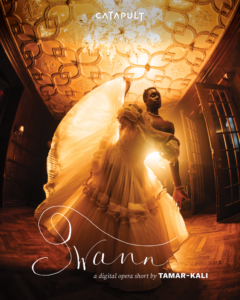
Q & A: Tamar-kali & James Blaszko on the Inspiration & Co-Creation of ‘SWANN’
By David SalazarEarlier this month, Catapult Opera released “SWANN,” a short film by Tamar-kali and James Blaszko, that spotlights William Dorsey Swann, “the first person known to dub himself a ‘queen of drag’ and the first American on record to pursue legal and political action to defend the LGBTQ+ community’s right to gather.”
Tamar-kali is a Brooklyn native who is a multi-hyphenate artist who has composed music for films, such as the Oscar-nominated “Mudbound, “the psychological drama “Shirley,” and LA Opera’s digital short “We Hold These Truths.” Blaszko has worked as a director with such companies as Detroit Opera, Boston Lyric Opera, and Daegu Opera House, among others.
OperaWire had an opportunity to speak with Tamar-kali and Blaszko about the creation of “SWANN” and what they hope audiences will take away from the experience.
OperaWire: I know that in the press release there is some background on the inspirations and genesis of the project, but I would like to know more about the process of creation.
Tamar-kali: I met with Neal Goren and Marcus Shields of Catapult Opera in the heart of the pandemic to discuss composing and creating a digital short.
During this period I was composing my first opera commission for LA Opera and had been doing a lot of musing around early 19th century Black Intellectual thought and the early Civil Rights movement. I drew the connection to William Dorsey Swann as part of a continuum. It was a natural progression and an irresistible opportunity to represent the spectrum of humanity present in Black life in America during this period.
Shining a light on our forbearers is essential to continuing the traditions of innovation, subversion and disruption they so fearlessly exemplified.
When considering text, my dear friend, brilliant artist and writer Carl Hancock Rux was a no brainer. This collaboration was a long time coming.
James Blaszko and I had been developing a friendship around our childhood Catholicism and love of the arts with the intention of working together for future stage productions. It became clear that he would helm the film component. We’ve developed a short hand over the past few years and I was able to convey my desires on imagery, intention and location easily.
His insight, instincts as a stage director and familiarity with the modern world of drag were assets to the production. He assembled an amazing team in a short span of time and brought a feeling of luxury to a small independent production.
OW: I found the decision to incorporate the text via the typewriter to be ingenious. Subtitles are necessary, but never incorporated into the overall visual aesthetic in a film or video. Same goes for the voiceover; it might seem counterintuitive in an operatic setting and yet, it is a natural aspect of filmmaking at large to have a voiceover over other sound. Where did these unique aspects of the artistic concept come from and how did they develop?
James Blaszko: I’m glad the text enhanced your experience of the film! I’ve been a major advocate for dynamic titling in opera ever since I started directing in the field. I think every show can benefit from integrating its titling into the story’s world, especially if the titles would otherwise be far above the audience’s heads in some void. Not only can font choice and animation help evoke the vibe (or even subtext) of a scene, they make accessibility super sexy!
In the case of “SWANN,” I was able to take it a step further and build the titles into the plot of the arresting officer, who I’ve depicted as typing up a sort of abstract manifesto on his way to breaking up the drag ball. It was Carl Hancock Rux’s rich text (which came to us as a nearly complete full-length libretto) that inspired me to propose an overlay of the two characters for this digital opera short.
I knew that I wanted Swann’s text to be animated in addition to the typewriter, but the successful integration of both would not have been possible without my Director of Photography John Shafto (who hand-wrote the cursive!) and brilliant Editor Matt Elias at Big Sky Edit.
OW: What do they hope that viewers take away from “Swann?”
TK: I hope that viewers take away an appreciation for the varied and eclectic reality of Black life in America. Our long standing presence and contributions have been an integral part of this nation’s story.
It is also my hope that the uncanny parallels between the late 1800’s and our present day political climate would provide a wider frame of context for the generations of LGBTQ+ Americans who have continually fought for their rights as citizens.
OW: What are some other future collaborations that we can anticipate from you two in the future?
TK: First up is an orchestral concert on July 5th that I have curated and am co-producing at Lincoln Center for their Free Summer Festival, “Summer for the City.” It is called “Freedom is a Constant Struggle” and James is Stage Director.
In May 2024 James will be directing a concert staging of an excerpt of Black Damask, my full length opera in development based on the life and times of William Dorsey Swann with libretto by Carl Hancock Rux.


